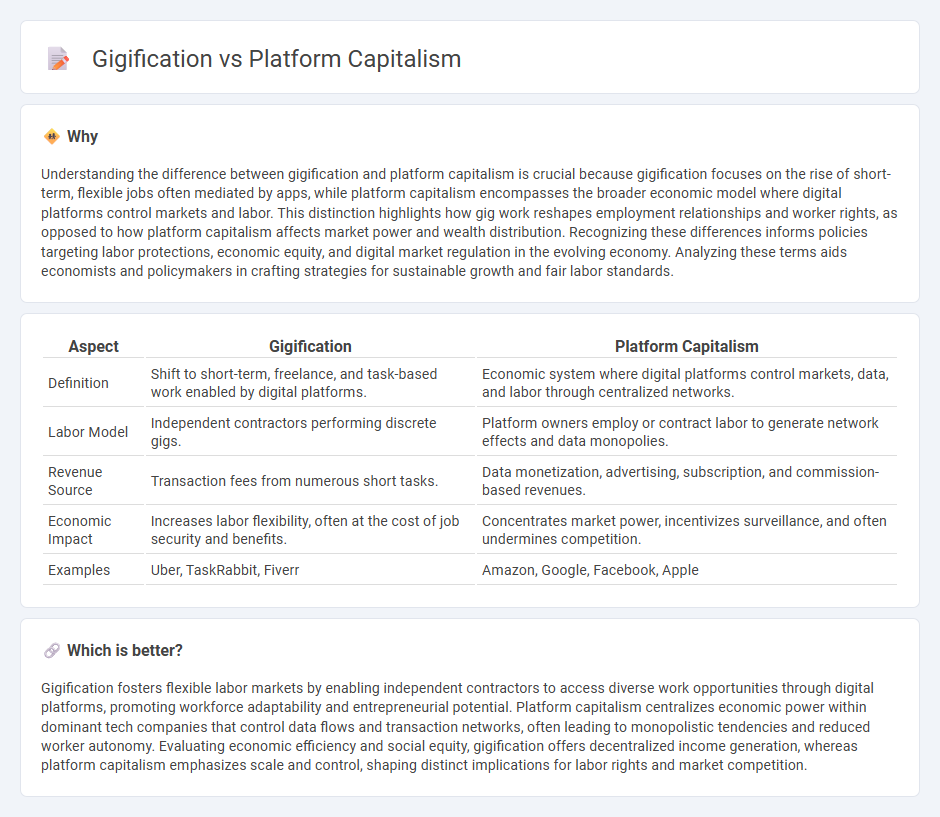
Gigification transforms traditional employment by enabling task-based, flexible work through digital platforms, emphasizing short-term contracts and independent work arrangements. Platform capitalism consolidates market power in large digital corporations that control essential online marketplaces and data, often leading to monopolistic tendencies and labor precarity. Explore the nuances of gigification and platform capitalism to understand their profound impact on the modern economy.
Why it is important
Understanding the difference between gigification and platform capitalism is crucial because gigification focuses on the rise of short-term, flexible jobs often mediated by apps, while platform capitalism encompasses the broader economic model where digital platforms control markets and labor. This distinction highlights how gig work reshapes employment relationships and worker rights, as opposed to how platform capitalism affects market power and wealth distribution. Recognizing these differences informs policies targeting labor protections, economic equity, and digital market regulation in the evolving economy. Analyzing these terms aids economists and policymakers in crafting strategies for sustainable growth and fair labor standards.
Comparison Table
| Aspect | Gigification | Platform Capitalism |
|---|---|---|
| Definition | Shift to short-term, freelance, and task-based work enabled by digital platforms. | Economic system where digital platforms control markets, data, and labor through centralized networks. |
| Labor Model | Independent contractors performing discrete gigs. | Platform owners employ or contract labor to generate network effects and data monopolies. |
| Revenue Source | Transaction fees from numerous short tasks. | Data monetization, advertising, subscription, and commission-based revenues. |
| Economic Impact | Increases labor flexibility, often at the cost of job security and benefits. | Concentrates market power, incentivizes surveillance, and often undermines competition. |
| Examples | Uber, TaskRabbit, Fiverr | Amazon, Google, Facebook, Apple |
Which is better?
Gigification fosters flexible labor markets by enabling independent contractors to access diverse work opportunities through digital platforms, promoting workforce adaptability and entrepreneurial potential. Platform capitalism centralizes economic power within dominant tech companies that control data flows and transaction networks, often leading to monopolistic tendencies and reduced worker autonomy. Evaluating economic efficiency and social equity, gigification offers decentralized income generation, whereas platform capitalism emphasizes scale and control, shaping distinct implications for labor rights and market competition.
Connection
Gigification drives the proliferation of on-demand work through digital platforms, transforming traditional employment structures into flexible, task-based arrangements. Platform capitalism leverages these gig economies by creating centralized, data-driven marketplaces that monetize worker productivity and consumer access. This synergy reshapes labor dynamics, concentrating economic power in platform owners while expanding gig-based income opportunities and precariousness for workers.
Key Terms
Labor Flexibility
Platform capitalism reshapes labor markets by leveraging digital platforms to mediate work, prioritizing flexibility in job assignments and hours but often at the expense of job security and benefits. Gigification extends this model by structuring labor as discrete tasks or gigs, intensifying workforce precarity yet enabling workers to optimize schedules and income streams. Explore the dynamics of labor flexibility in these evolving economic frameworks for a deeper understanding.
Digital Intermediation
Digital intermediation within platform capitalism transforms traditional markets by leveraging algorithms and data to connect service providers and consumers on demand, creating a dynamic yet often precarious gig workforce. This gigification process redefines labor relations by emphasizing flexibility and micro-tasking, frequently at the expense of job security and benefits. Explore how digital intermediation reshapes economic structures and the future of work in gig economies.
Precarization
Platform capitalism intensifies precarization by commodifying labor through digital platforms, leading to unstable income and limited worker protections. Gigification amplifies this trend by fragmenting work into short-term, task-based engagements, often lacking social security and benefits. Explore further to understand how these economic shifts reshape modern labor dynamics.
Source and External Links
Platform capitalism - Wikipedia - Platform capitalism describes companies like Google, Facebook, Apple, Uber, Airbnb, and Amazon operating as platforms providing hardware and software foundations for others to build businesses, focusing mainly on profit and resulting in entire industries relying on and vulnerable to these tech firms.
Book Review: Platform Capitalism by Nick Srnicek - LSE Blogs - Platforms are intermediary digital infrastructures that thrive on network effects, cross-subsidisation, and constant user engagement to generate vast capital and market control with little productive input after initial construction, often creating monopolistic economies.
Platform Capitalism | Wiley - The rise of platform capitalism marks a shift where a few tech giants dominate the economy by carving up market sectors and introducing new capitalist tendencies that challenge visions of a post-capitalist future, transforming global economic relations profoundly.
 dowidth.com
dowidth.com